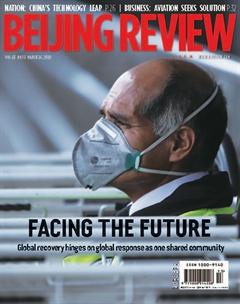TOP EPIDEMIOLOGIST’S VACCINE BREAKTHROUGH
TOP EPIDEMIOLOGISTS VACCINE BREAKTHROUGH
Chen Wei, an academician at the Peoples Liberation Army (PLA) Academy of Military Medical Sciences, has made critical progress in developing a novel coronavirus vaccine with the support of her research team.
The military medical expert team has been working in Wuhan in central China for more than a month to develop a recombinant subunit vaccine. It passed the registration review phase of clinical research and was approved for clinical trial on March 16.
The vaccine has been approved for safety effi cacy and quality by a third party. Chen said it was also ready for mass production.
According to the World Health Organization, a recombinant subunit vaccine uses only a fragment of the pathogen to stimulate a protective immune response and is based on a relatively more mature technology.
Chen, a 54-year-old PLA major general, was involved in combating severe acute respiratory syndrome in 2003. She also led a team in developing the worlds fi rst gene-based vaccine for Ebola in Africa in 2014. She was selected as an academician of the Chinese Academy of Engineering in 2019.
IPR Governance
Guangming Daily March 16
Companies have registered the names of hospitals built to tackle the novel coronavirus epidemic, such as huoshenshan and leishenshan, as trademarks, drawing widespread condemnation from the public. The National Intellectual Property Administration recently implemented new controls over trademark registration and application, rejecting 63 such cases in accordance with the Trademark Law.
This move shows that the importance of intellectual property rights (IPR) has been consolidated in the public consciousness. Moreover, China has established a legal ecosystem which protects IPR, with crackdowns on malicious trademark registration.
The registration of a new trademark usually goes through two stages. The fi rst stage sees the inspection documents for the application. The trademark is then checked to see whether it is in conflict with existing registrations. The potential for wrongdoing, such as fraud, is also part of the evaluation process.
Huoshenshan and leishenshan have become synonymous with the two hospitalscontribution to epidemiological prevention and control. If businesses abuse them for profit, it would have a negative impact on society. According to the law, trademarks that have a detrimental effect on morals or social customs shall not be used or approved for registration. This rule is indicative of how the law is designed to protect social values and also suggests the synergy between the rule of law and virtue in national governance.
Stabilizing Employment
Peoples Daily March 11
China is to step up efforts to keep employment stable via comprehensive measures.
As a vital source of the nations employment, small and medium-sized enterprises contribute over 80 percent of job opportunities of Chinese enterprises. During the resumption of production, they need more support to overcome difficulties. The Chinese Government has announced preferential policies to help such businesses through this transitional period.
Entrepreneurship creates jobs. It is therefore necessary to further optimize the business environment and reduce the costs of starting a business.
After the outbreak has passed, there will be changes in the industrial structure, modes of production and peoples way of life. Sectors, including city governance, public health and healthcare, will be the focus of attention. These changes will inevitably place higher demands on the workforce. Education and training must be correspondingly improved to support these employees. Government at all levels can provide specialized training courses to assist those who either lose their jobs or are forced to change their employment due to the pandemic.
Specific approaches should be implemented according to the circumstances of different sectors. This year will see 8.74 million new college graduates. To lessen the pressure on the job market, the State Council has decided to expand the admission of masters and undergraduate students. Authorities, including the Ministry of Education, have also announced policies to aid students in handling graduation formalities. It is hoped that measures by universities themselves will further increase the number of jobs for graduates.
Protecting Consumers Rights
Beijing Youth Daily March 16
Complaints pertaining to consumption during the epidemic are revealing various problems in the market. They are also an indicator of local authorities emergency strategies.
According to data released by the China Consumers Association on March 15, the organization received over 180,000 complaints related to the epidemic between January 20 and February 29. The top three causes for complaint were price, contracts and quality, accounting for nearly 45 percent, 19.5 percent and 11.7 percent, respectively.
In response to peoples dissatisfaction, the government has increased the supply of necessities such as pork and vegetables, with complementary efforts by companies to meet peoples demands. Market regulators at national and provincial levels have introduced regulations to stabilize prices. In terms of masks, authorities have cracked down on manufacture and distribution of low-quality products. New challenges continue to emerge during the epidemic. For scarce commodities, such as masks and disinfectants, protecting consumersrights has traditionally focused on whether people can access products. Yet the current crisis has lowered peoples requirements on product quality. Restricted by certain controls, testing institutions are also fi nding it diffi cult to provide comprehensive services.

